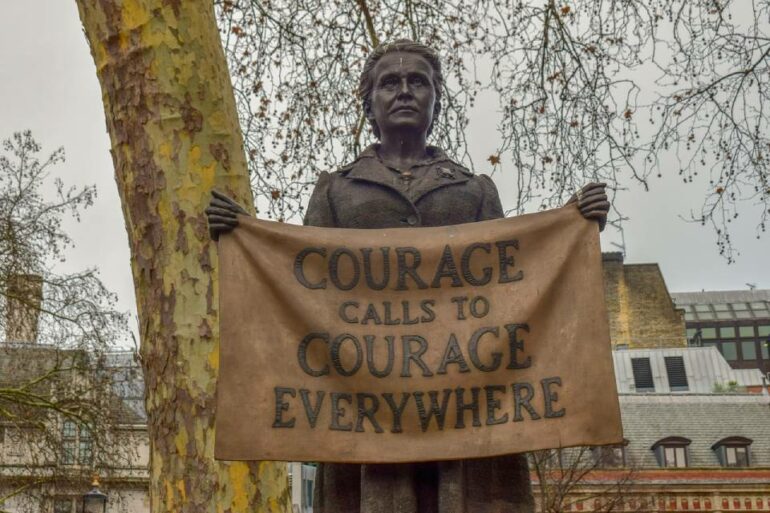In Anatomy of a Fall, Sandra Hüller’s performance challenges patriarchal norms. Through its narrative and courtroom drama, the film critiques the vilification of independent women and rejects simplistic views on guilt, love, and betrayal in a rigid, formulaic world.
Content note: The following text includes descriptions of suicide. If you are looking for support, you can find it in Göttingen here: Psychiatric Emergency Care.
By Erva Turan
In her speech in 1931, Virginia Woolf claimed that for women writers to freely practice their craft, they must »kill the angel in the house«– rejecting the ideal of self-sacrificing womanhood. This Victorian ideal demanded woman to be passive and nurturing to others at the expense of their own desires, with female sexuality restricted to male pleasure. Nearly a century later, the movie Anatomy of a Fall embodies a modern take on this notion and this feminist resistance through Sandra (Sandra Hüller), a successful author whose noncompliance to fit in the patriarchal expectations make her a target of patriarchal hostility, depicting her as a ›monster‹.
Feminist Victory in Cinema
Premiering at Cannes in 2023, Anatomy of a Fall won the Palme d’Or, making the movie’s director Justine Triet only the third female director to receive the prestigious award. Starring the German actor Sandra Hüller, Triet and co-writer Arthur Harari employ a multilayered narrative that invites the audience to take a seat in the courtroom and assume the role of the jury for the main character Sandra’s ongoing trial where she is being prosecuted for her husband Samuel’s death, despite a lack of evidence. By refusing to assign fictional names to her characters; instead, retaining the real-life names of the actors, Triet blurs the line between fiction and reality, to display that the events take place in the movie are not only fictive but they hold a mirror to the struggles and biases faced by the women in our society. Triet’s success, and Sandra’s victory in court, encourages female artists to fight for their voice and assert their space in male-dominated spheres.
Idyllic Outside, Dead Inside
Beyond familiar themes like communication breakdowns, monetary struggles, and resentment between spouses over unfulfilled lives, the movie critiques a patriarchal society that upholds rigid empirical values while dismissing emotional complexity. It reveals the blind spot patriarchy creates in men, discouraging emotional expression. This is why Samuel’s fall is repeatedly analyzed through physics formulas and rational explanations, rather than acknowledging the emotional complexities and vulnerabilities that may have led to it.
Early in the movie, the image we are presented with is a typical family. Sandra and Samuel, both writers, move to an isolated chalet in Grenoble to cut expenses and find inspiration, with Samuel suffering from writer’s block. As the plot unfolds, it is revealed that his frustration and difficulty in writing stem from feeling responsible and guilt over their son Daniel’s accident, which left him visually impaired. The illusion of familial harmony shatters by the discovery of Samuel’s lifeless body outside of the house. What follows is an intense investigation into whether he took his own life or was pushed by his wife, Sandra.
Samuel is a presence in the film, but never in the present. He only exists in flashbacks and echoes – his voice, his image, his unfinished work. His absence in the film serves as a reflection of his own emotional and psychological state. He is a man who has already faded from life long before his actual death – dissatisfied with himself, creatively blocked, and burdened by guilt which finally led him to commit suicide by jumping out of the window. Samuel’s gradual disappearance from life mirrors how patriarchy conditions men to equate self-worth with authority and superiority over women.
The chalet where Sandra and Samuel live becomes a powerful metaphor for their fractured marriage. On the surface, it’s a beautiful, isolated home with a mesmerizing mountain view, yet inside, it’s incomplete and requires a lot of work – just like their relationship. Samuel, as we learn, has many unfinished tasks. He starts but fails to make the ends meet. He resents Sandra even more for being a successful author, blaming her for stealing his idea, ignoring the creative transformation she undertook to make it her own which, in turn, is used against Sandra in the courtroom, reinforcing the patriarchal belief that a woman’s achievements must be borrowed from a man.
The Sound of Patriarchy
The instrumental version of P.I.M.P. by 50 Cent serves as a powerful leitmotif in the movie, reinforcing the presence of patriarchal forces in Sandra’s life even when they are not directly voiced. Samuel plays the song on loop while working on the house’s insulation symbolizes his entrapment in the cycle of guilt, unfulfilled potential and unacknowledged emotions. One of the most striking uses of sound occur during Sandra’s interview with a student, where the conversation is drowned out by deafening construction noise and the same song – introducing Samuel’s presence not through his own voice but through these beats. After his fall, Sandra reports to investigators that she and Samuel had a discussion while the song was still playing in the background. In their attempt to determine whether it was a heated argument or a calm conversation, the investigators repeatedly play the song, reenacting the scene to analyze the pitch of their voices, further reinforcing its connection to Samuel’s presence. The use of the instrumental version of this utterly misogynistic song seems to be an intentional choice, implying that even though the voice of the patriarchal figure is taken away, it still sets the tone of the film and disrupts Sandra’s life.
2 + 2 = 5
The courtroom becomes a battleground where Sandra’s personal life is anatomized and studied more than the accusation itself. The male prosecutor fixates on her bisexuality, past affairs, trying to paint her as a selfish and monstrous mother and wife who murdered her husband. The absurdity doesn’t end here. The investigation’s reliance on diagrams and physics to determine Samuel’s fall is an attempt to reduce human emotions to mathematical formulas.
Despite the accusations of murder and the intense scrutiny of her sexuality and personality, Sandra captures our attention by remaining composed and assertive. Even in vulnerable moments, such as when she cries, she manages to make jokes and laugh, maintaining control over her emotions. One of the reassuring displays of her self-control occurs when the scene builds to what seems like a moment where she and her lawyer and also ex-lover are about to kiss, Sandra turns her cheek instead, not engaging in physical contact. This act perpetuates movie’s agenda to empower women and show that a woman does not need to turn to a man for comfort or validation. It also highlights that Sandra does not act impulsively, but rather balances rationality with feeling.
A crucial courtroom moment occurs when the female student who interviewed Sandra is called to testify. The male prosecutor attempts to frame Sandra as predatory, making unwanted advances towards her, but the student firmly rejects his narrative. Her solidarity with Sandra challenges the patriarchal notion that women’s relationship to each other can only be competitive or antagonistic. A significant exchange in this scene takes place when the prosecutor addresses the student as »Miss Solidor«, to which she replies, »Madam Solidor. Please do not reduce me to my marital status.« The female judge later respects her title, reinforcing female solidarity. By placing a woman at the head of the court, Triet envisions a future where women actively shape discourse rather than merely being judged by it.
Justice Restored

Anatomy of a Fall (2023)
Starring: Sandra Hüller, Swann Arlaud, Milo Machado-Graner
Anatomy of a Fall refuses to provide easy answers about innocence, guilt, and betrayal, instead mocking the absurdity of reducing human experience to formulas and cold rationality. The judge’s ruling in Sandra’s favor represents more than legal justice, it is a symbolic victory for women. Triet offers an empowering resolution, encouraging women to continue fighting against patriarchal constraints, reclaim their voices, and define themselves beyond traditional roles.







very informative articles or reviews at this time.